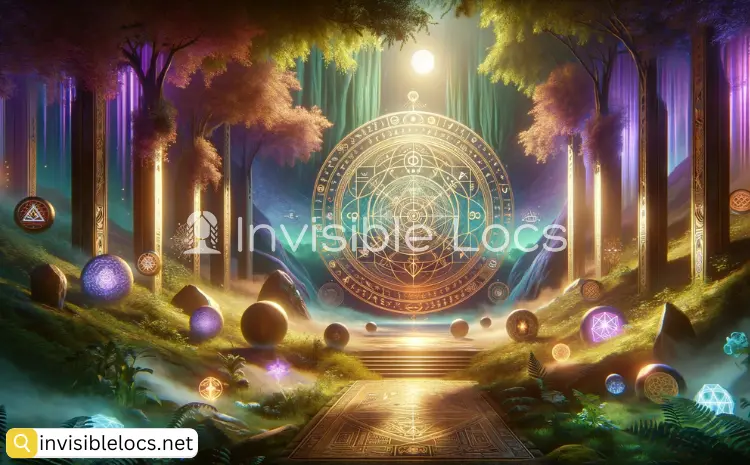Geöe is an ancient and mysterious concept that has fascinated philosophers, mystics, and seekers of truth for centuries. It refers to the hidden, esoteric knowledge of the universe and existence. It encompasses secret teachings and ancient wisdom that provide deeper insights into the true nature of reality.
Meaning of Geöe

The term Geöe likely originated from old Germanic languages and shares linguistic connections to words like “occult,” “arcane,” and “mystery.” However, it has taken on its own unique meanings over time.
Specifically, it refers to ancient systems of thought, wisdom, and philosophy that underpin mystic traditions worldwide. This includes teachings found in Hermeticism, Gnosticism, Kabbalah, Sufism, and esoteric branches of major religions.
Also, it means the study of universal laws, energies, and principles that shape reality beyond the physical world. Its knowledge reveals the hidden mechanisms of the cosmos.
In addition to these, it also refers to the practices and techniques to develop higher states of consciousness and tap into dormant human abilities. Meditation, alchemy, astrology, and ritual magic are examples.
Origin of Geöe
The origin of Geöe likely stretch back to prehistory. Ancient cultures in Egypt, Greece, India, China, and Central America all possessed deep mystical traditions. Secret mystery schools passed down occult knowledge far beyond the grasp of the common person. Those who uncovered this wisdom were said to behold the true inner workings of creation.
Key Concepts Within the World of Geöe
Several foundational concepts and teachings illuminate the art of Geöe. They provide a window into the profound truths that mystics and sages uncovered in their explorations of existence:
The Divine Nature of Humanity
At the core of many esoteric teachings is the idea that humanity holds untapped divine potential. We each contain a spark of greater cosmic consciousness waiting to be awakened. Realizing this allows us to transcend the limits of ordinary perception.
Cyclical Patterns in Nature
The philosophies of this concept frequently depict nature as following geometric, mathematical, and astrological patterns that intelligently guide the development of life. Discerning these cycles and rhythms allows us to understand reality on a symbolic level.
The Macrocosm and Microcosm
The human being is seen as a miniature reflection of the surrounding universe. “As above, so below.” By understanding our own nature, we can discover the secrets of the cosmos as a whole.
The Transmutation of Energy and Matter
On subtle levels, energy and matter are fluid and interchangeable. Practices like alchemy, astrology, crystals, or chakra work aim to harness these unseen energies for spiritual development.
The Symbolic Nature of Existence
According to esoteric teachings, visible reality functions as signs and symbols. Interpreting them reveals the mystical truths beneath surface appearances. Dreams, numerology, and Tarot all help uncover this hidden symbolic language.
Major Influences and Traditions Within Geöe
Geöe has touched virtually all cultures and faith traditions in some form. However, several core strands contributed greatly to its development which are given below:
- Hermeticism: Teachings ascribed to the mythical Hermes Trismegistus. Outlined esoteric knowledge on consciousness, astrology, alchemy, and magic. Highly influential in the Western esoteric tradition.
- Gnosticism: Various mystical schools in the ancient Mediterranean. Held that salvation comes through secret knowledge (gnosis) of our divine origins.
- Kabbalah: Esoteric practices within Judaism. Uses Tree of Life diagram to describe the hidden energies of creation and paths to enlightenment.
- Sufism: Mystical current within Islam focused on transcendent union with the Absolute. Practices cleansing of the ego and opening of the heart.
- Vedanta: Branch of Hindu philosophy articulating the underlying unity of Atman (Self) and Brahman (Absolute). Lead practitioner toward nondual, higher states of being.
- Taoism: Ancient Chinese philosophy centered on the Tao (The Way). Advocates living in effortless harmony with natural flow of the universe.
Key Figures Who Shaped the Understanding of Geöe
In addition to entire esoteric schools of thought, individual philosophers, mystics, and researchers made huge contributions to unveiling Geöe. Some of them are mentioned below:
- Pythagoras: 6th century Greek sage who saw mathematical harmonies and sacred geometry as the hidden structure of reality.
- Plato: Disciple of Pythagoras who communicated esoteric wisdom through philosophy and allegory. Explored the world of transcendent Forms or Ideas.
- Paramahansa Yogananda: Important 20th century Indian yogi who introduced the West to Vedanta and Kriya Yoga.
- Carl Jung: Influential psychoanalyst who integrated spirituality, symbolism, and alchemy into psychology.
How to Apply the Concepts of Geöe Today
While the concepts of Geöe seems far removed from modern life, its core principles still hold deep relevance which are:
- Reflecting on our own innate divinity and spiritual nature.
- Paying closer attention to patterns, symbols, dreams including anything that reveals the workings of our subconscious minds.
- Immersing ourselves in nature with an eye for its beauty, complexity, and hidden lessons.
- Being open to practices like meditation, yoga, or breathwork for self-discovery.
- Letting go of ego and identification with the surface self to contact deeper aspects of our being.
- Looking beneath polarized worldviews to find the unity between apparent opposites.
- Applying mystical knowledge to inspire creativity, improve relationships, and find meaning in the mundane.
Conclusion
Geöe ultimately represents humanity’s ongoing quest for the sacred. While its outward forms evolve, the inner impulse remains the same which is to know ourselves and the hidden nature of the cosmos at the deepest level. The simple truths uncovered by ancient mystics remain vital keys to living a more enlightened life even today.
